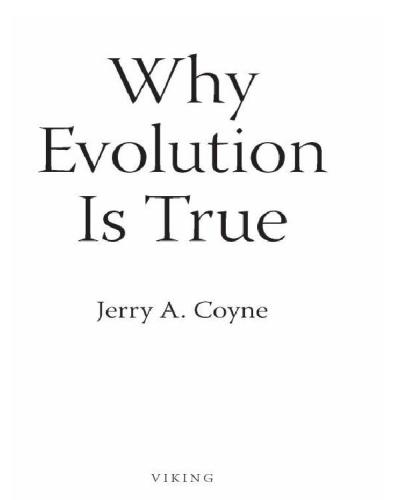
Why Evolution Is True
کتاب های مرتبط
- اطلاعات
- نقد و بررسی
- دیدگاه کاربران
نقد و بررسی

Starred review from October 6, 2008
With great care, attention to the scientific evidence and a wonderfully accessible style, Coyne, an evolutionary geneticist at the University of Chicago, presents an overwhelming case for evolution. Ranging from biogeography to geology, from anatomy to genetics, and from molecular biology to physiology, he demonstrates that evolutionary theory makes predictions that are consistently borne out by the data—basic requirements for a scientific theory to be valid. Additionally, although fully respectful of those who promote intelligent design and creationism, he uses the data at his disposal to demolish any thought that creationism is supported by the evidence while also explaining why those ideas fall outside the bounds of science. Coyne directly addresses the concept often advanced by religious fundamentalists that an acceptance of evolution must lead to immorality, concluding that “evolution tells us where we came from, not where we can go.” Readers looking to understand the case for evolution and searching for a response to many of the most common creationist claims should find everything they need in this powerful book, which is clearer and more comprehensive than the many others on the subject. Illus.

Starred review from November 15, 2008
November 2008 marks the 150th anniversary of the publication of Darwin's "On the Origin of Species", and Coyne's (Univ. of Chicago) excellent volume offers a crystal clear presentation of the evidence for evolution with no polemics, unnecessary technicalities, or undue epistemological speculation. His prose is not fancy but compelling in its clarity. This is Coyne's first book for a general audience; he has been doing distinguished research on speciation for many years and has written magazine articles on evolution and related topics. The author brings his extensive knowledge of evolution to his writing but is spare with details of his own work, concentrating on explaining all the independent lines of evidence for evolution. These include the fossil record, vestigial organs, embryology, makeshift design, biogeography, direct and indirect observations of natural and sexual selection, and observations of speciation itself. He addresses the perennial counterarguments with effective dispatch without being insulting. Many recent writers, from Stephen Jay Gould and Richard Dawkins through Sean B. Carroll and Neil Shubin, have made wonderful contributions to the public understanding of evolution, but Coyne has done the best job of simply laying out the evidence. Highly recommended for all libraries.Walter L. Cressler, West Chester Univ. Lib., PA
Copyright 2008 Library Journal, LLC Used with permission.

Starred review from January 1, 2009
Far more presentational than disputatious, Coynes demonstration that evolution has proven itself in lab and field is still a deliberate answer to anti-evolutionism, especially creationism or intelligent design (ID). At its most comprehensive, creationism/ID claims that each species is the product of a separate creative act; less universally, that at least humans were so created. Frequently throughout lucid, accessible chapters on the fossil record, vestigial features of modern bodies (e.g., the tail rarely seen but documented in newborns), biogeography, natural selection, sexual selection, speciation, and human evolutionthe basic areas of evolutionary investigationCoyne remarks that the material evidence confirms evolution, not creationism/ID. For the evidenceshows complexities and imperfections that creationism/ID cant explain or even allow, for that would necessitate positing a sloppy, imperfect creator or intelligence that couldnt fashion creatures to ideally fit either their habitats or their bodies. Evolution, on the other hand, expects imperfection and jerry-rigging, and the physical findings, lately made much more precise by genetic analysis, just bolster confidence in it. In conclusion, Coyne wonders what it would take to convince the apparently reasonable people who still deny evolution. A new Milton, perhaps, to justify evolutions ways in great poetry? Meanwhile, at a timethe Darwin bicentennial and Origin of Species sesquicentennialwhen good evolution books are rife, Coyne has given general readers one of the best.(Reprinted with permission of Booklist, copyright 2009, American Library Association.)

























دیدگاه کاربران